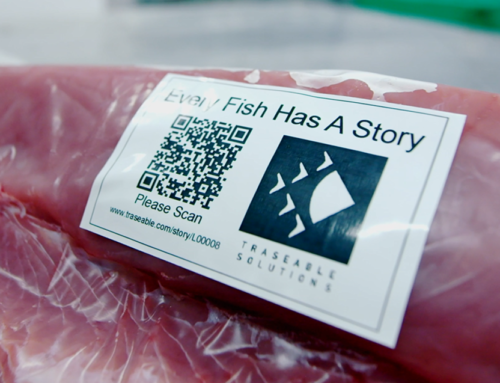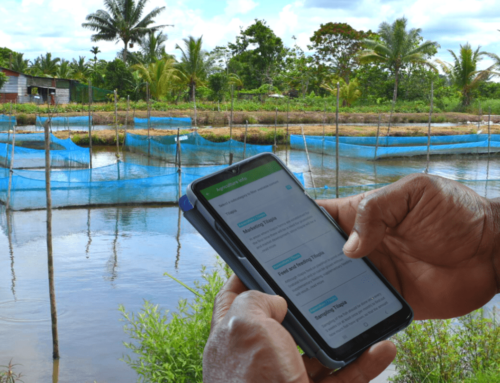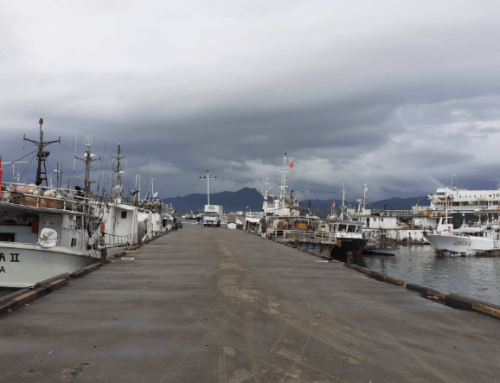Digitalisation
A regional networking event organised by CTA in Tonga resulted in a business relationship between two Fijian agro-based enterprises that has exciting prospects for Pacific Island value chains and nutrition.
The networking event in December 2018, which was initiated under the project ‘Promoting nutritious food systems in the Pacific Islands’, aimed to facilitate opportunities for regional agro-based small- and medium-sized enterprises (SMEs) to network, share experiences and learn from each other. Among the 100 attendees were TraSeable Solutions, one of the ICT teams competing in the finals of the concurrent 2018 Pacific AgriHack Lab, and Nature’s Way Cooperative (NWC), which was participating in the learning journey to Tonga. Though both from Fiji, neither had met before.
NWC carries out mandatory quarantine treatment on Fijian fruit and vegetables under the Bilateral Quarantine Agreement established with importing countries. Founded in 1995 and handling 30 t of papaya a year, NWC now treats and packs 1,300 t of papaya, mango, breadfruit and aubergine for export annually. The exporters, who are cooperative members, buy their products from farmers, who are also cooperative members, and bring them to NWC for treatment and packing before shipment overseas. NWC currently has around 350 member shareholders, most of whom are small farmers.
Looking to modernise its processes, NWC applied for an Innovation Grant Facility (IGF), a CTA and IFAD-funded grant of up to €17,000 to enable Pacific agro-SMEs to expand their business and contribute, directly or indirectly, to the sustainable development of the agriculture and fishery sectors.
“We saw the IGF as an opportunity to introduce a more efficient traceback system for our export commodities, as part of a broader strategy around digitalising our value chain”, explains Donald Pickering, NWC’s general manager. “Specifically, we used the grant to digitalise our grower supply form and develop a web-based traceability system that links the grower supply information with the treatment data of the supplied commodities. In addition, we are transitioning from multiple stamped codes on export cartons to a single printed QR code linked to the traceability system. This will provide real-time data on the carton and/or consignment and vastly improve traceback times if any issues arise.”
Following their initial meeting in Tonga, NWC contracted TraSeable Solutions to build the traceability system after verifying the company had the right experience and capabilities to meet NWC’s needs. “We also preferred to engage a local service provider because it facilitates technical support and maintenance”, Pickering adds.
Winning digital innovation
TraSeable Solutions was one of three winners of the 2018 Pacific AgriHack Lab, for its TraSeable Farms concept.
“SMEs and producer organisations play an important role in the value chain development and sustainability of food systems in the Pacific, but they need financial assistance, infrastructure and mentoring”, says Dimsoy Cruickshank, CTA Operations Officer, Pacific Islands Food Systems Project. “The AgriHack Lab competition was initiated to address the limited support for upscaling novel and existing ICT platforms and applications as well as to spur the development of prototypes that would specifically attract the most farmers and SMEs involved in local food crops and fisheries value chains.”
Fifteen teams took part in the finals of the competition, which incorporated training in key areas of agribusiness such as access to finance, designing a viable business model and understanding intellectual property rights. The winning innovations were selected on ‘pitching day’, when the finalists pitched their solutions before a multidisciplinary panel of public and private sector judges. Each winner received €5,000€ to encourage further development and marketing of their innovation.
“Having spent over a decade designing and building information systems, providing record-keeping and analytics tools and pioneering the use of blockchain technology in many Pacific Island countries, we are well aware of the challenges faced by actors in the food value chain. These include digital infrastructure, information sharing, market access, produce traceability, logistics and training”, says Kenneth Katafono, managing director of TraSeable Solutions with his wife and co-founder Shaunalee. “TraSeable Farms aims to put the TraSeable Solutions web platform and mobile application in the hands of farmers, buyers, logistics providers, farming cooperatives, processors and exporters at an affordable price. Therefore, any farmer can easily access markets and transportation to move their produce.”
The company also invests a significant amount of time in advocacy and education work around the need for and benefits of traceability, digitalisation and blockchain technology in Pacific Island countries, most recently during the Strike Two summit, of which CTA was a partner.
“We’re clearly seeing the impact of these efforts in demand for our own products as well as increasing interest across the sector”, Katafono continues. “In 2019, our revenue grew almost 270% on the previous year, and through CTA’s work in the Pacific we’ve been able to develop relationships that have turned into clients, particularly in agriculture, as was the case with NWC. Previously, we were very focused on fisheries. Even so, traceability technology is still a very tough business to be in – not just in Fiji but globally. However, our conviction has always been that traceability will become the norm in value chains, especially related to food.”
Opening up high-value markets
The system TraSeable Solutions built for NWC has now been tested and validated. It is expected to be fully operational in the second quarter of 2020. “In our opinion, the greatest achievement working with NWC so far has been the mindset change around data and what is possible when you capture it electronically”, according to Katafono, who believes the produce tracking reports the system is able to generate will be a particular asset to NWC in the future.
Pickering agrees, saying that the system will enhance NWC’s credibility in the value chain and help ensure it consistently meets market demands. “We will shortly start the process of acquiring GlobalGAP, a food safety and sustainability certification that opens up commercial opportunities in high-value markets. An important requirement for this certification is traceability from the farm to the final customer, which the new system will enable us to meet.”
Originally published Thursday 16, April 2020 on www.cta.int
Pacific ICT innovator and exporter connect to improve value chain performance
IMPACT STORY
http://www.cta.int/en/digitalisation/all/article/pacific-ict-innovator-and-exporter-connect-to-improve-value-chain-performance-sid0977b3daf-56cf-4563-b640-e439b388f73d
Photo courtesy of NWC/CTA.





